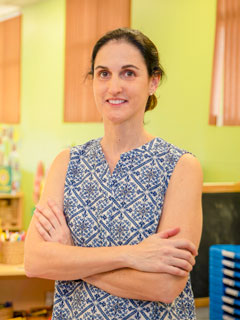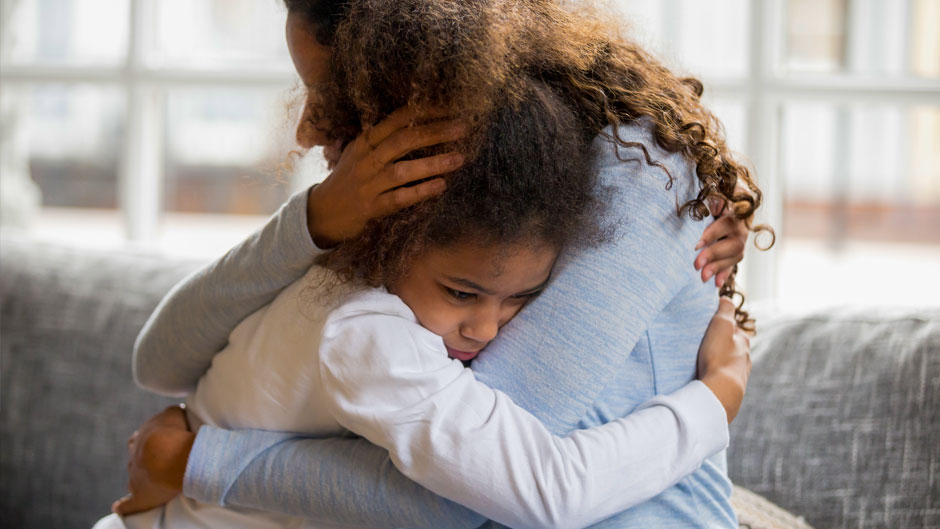If you are a parent, you’ve seen the face. Your child looking at you full of hope, asking when they can go play with their friends again.
As you sadly explain that no, we cannot go visit a friend this weekend, head to a playground today, or school next week, you realize the uphill battle it will be to quell your child’s emotions.
During this time of quarantine, everyone is mourning the loss of social interaction. But children are having a particularly tough time.

“Friends are a significant source of support at any age, and children, like many adults, feel pretty frustrated by the circumstances now,” said Annette La Greca, distinguished professor of psychology and pediatrics who has studied trauma, risk, and resilience in children for three decades. “It’s great that there are a number of ways we can still stay connected today, but it’s still not the same as seeing someone in person. And many of us are feeling a sense of sadness and loss for what we had before.”
With the outbreak of COVID-19, most families sense of normalcy and routines have been completely upended. Schools have been closed, and there are still no definite plans about when they will reopen.
Despite the challenges, there are ways that parents can help children process their feelings, University of Miami child psychologists say. La Greca has even released a manual for parents to use in explaining the pandemic to children, called “Helping Children and Families Cope with COVID-19," with tips for how to build resilience and reduce stress during the pandemic, many of which are listed below.
Still, it’s important to understand children’s feelings.

“Being part of a community and part of one’s school is tied to children’s well-being,” said professor Jill Ehrenreich-May—a clinical child psychologist who studies and leads a treatment program for anxiety, depression, and obsessive-compulsive disorders in children—who has just launched a treatment research study for parents struggling with anxiety and stress during COVID-19. “A key part of being in school is socializing with other people. It’s a learning process, just like math and reading, except kids are learning to get along with people. They get feedback from their peers, and then change and adapt to have a skill set socially and emotionally to navigate future interactions.”
While teenagers may be used to communicating electronically, for young children the void of social activity is especially challenging, Ehrenreich-May added. Rebecca Bulotsky Shearer, associate professor of psychology, agreed.
“The nature of learning is so social and interactive in young ones, children learn by directly touching and exploring their world and it’s really hard to do that on a screen,” said Shearer, who is also a child and school psychologist with expertise in developing social-emotional health within children, particularly preschoolers.

So, what can parents do to try and make this time as comfortable as possible for their kids?
- Listen to your children.
“If they are worried about something in the news or miss their friends, it’s probably more important to pause, listen, and talk with them because they look to you for that. And if you can support them, it goes a long way,” Shearer said.
This is particularly important if your child needs to log in to virtual classes.
“The foundation of learning is your social emotional health,” she added. “Children cannot learn if they are feeling worried or sad.”
Ehrenreich-May agreed: “It may not be when you expect, but be prepared to listen and to give them the time,” she said, suggesting that parents acknowledge kids’ feelings by responding with phrases like: “I can understand why... .” She also said parents can explain that adults may not have all the answers right now.
- Keep an established routine.
In this pandemic situation, it is difficult for all of us. But try to keep bedtimes and mealtimes the same. Children, especially, feel like things are normal and predictable if they have a routine, La Greca pointed out.
“We know that children thrive off structure, so try to give them some sense of structure,” Ehrenreich-May said. “It doesn’t need to be perfect.”
- Make time for your kids to socialize through phone calls or video conferencing apps.
Find ways to fit your child’s friends into their days, La Greca said, because peer relationships are a critical support system for children.
“If your child normally sees their friends at a sports activity after school twice a week, maybe they could go bike riding with parents some days, but other days do a shared Zoom activity with a friend,” she suggested, adding that kids can create a drawing where they show each other the results, discuss a book they both read, or even simply share jokes (or memes). “Parents need to plan this, so it is part of the schedule and gives kids something to look forward to,” noted La Greca.
- Explain the basics, but don’t go into too much detail about the pandemic.
“Talk to kids at their level, using child-friendly terms,” Ehrenreich-May said. “Be specific and brief.”
Shearer suggested using social stories to explain the coronavirus to young children. These are digital story books developed especially for them to understand the pandemic and the need for social distancing. They are similar to books that early-childhood teachers often use with their students. For older children, activities in La Greca’s manual will be especially useful, including key terms and definitions about the virus.
Social Stories:
https://youtu.be/xkZ23tDzN4c
https://drive.google.com/file/d/1Sl-wI1Cfp5HJ7QBszjoisLcYC14H2PU-/view
https://childdevcenter.org/news/social-stories-for-kids-about-covid-19/
For families with health care workers: https://jacksonhealth.org/library/education/HowToCope_HealthcareHero_ActivityBook.pdf
- When you can, let kids choose what to do for fun.
Give them a sense of that freedom and play that they may usually get with their friends, Ehrenreich-May said. Offer to make a silly video with them, or if they want to paint your hand, let them.
“This is an opportunity to connect with your kids—even teens,” she said. “Adolescence is a time when kids are purposely pulling away from their parents, so the normal autonomy they are seeking has been impacted very directly by this quarantine. So, we have to understand that as parents and recognize that this may be very frustrating for them.”
- For teens, try to foster their independence in positive ways.
Is there something you can find for your teens to help with at home? If there is an opportunity to have an adolescent-led project, make it happen, if your resources and time allow, Ehrenreich-May added.
- Limit screen time about COVID-19.
Don’t just leave [the news] playing in the living room with the constant banner of the coronavirus threat because that may even further exaggerate the threat to your children, who are not necessarily going to have the ability to temper that with other factual information, Ehrenreich-May said.
- Model effective behavior and compassion.
If you as a parent are stressed, take a break. Explain that you are going to go sit outside or talk to a friend on the phone, Ehrenreich-May suggested. In addition, try to exemplify compassion when children are stressed.
“My kids are struggling to adapt to online learning too, and I can see their effort is not always there, but I know they may not have the attention span to do the work,” she said. “So, I’ve learned to accept that my child is doing their best, and I acknowledge and praise them for whatever ways they are doing their best each day.”
- Exercise daily.
Staying fit reduces anxiety and depression and “the more fit you are, the better you deal with stress,” La Greca said.
- Create a place where kids can go and calm down if they need to.
Parents can create a “calm-down corner” in the home; so if kids feel out of control, they have an area to wind down, said La Greca. This will be especially helpful when they get frustrated and need a way to cope.
- Give yourself a break.
“It’s really hard to parent in an effective way when you’re stressed out too,” said Shearer, who is also a parent to three children. “The most important thing is to love your kids. Just take a breath and make sure there is a quiet moment for you during the day. This won’t last forever, so do the best you can under the circumstances.”
La Greca agreed that adults need to take care of themselves, too, and even included a section on adult self-care in the manual. The experts agreed that parents should not be afraid to reach out and get support for themselves during this challenging time. Faculty and staff of the University can get more information here.
- Try to stay relaxed.
“We can only live in the moment and make today as good as it can be,” La Greca said. “Mindfulness can offer exercises to focus on things in the present and those can help to deal with the uncertainty of this situation.”
Activities to do with children during this time:
Some creative ideas include creating a COVID-19 story, diary, or scrapbook, so that kids can later remember this historic time, La Greca suggested.
Another idea that Shearer recommended is each time a child says “I wish we could ...” have them write it on a slip of paper and put the paper into a bucket or container. Once it is safe to do them again, families can draw the slips of paper randomly and do the activities on weekends or during free time.
Other resources:
Screen time recommendations:
https://www.srcd.org/event/home-child-experts-science-screen-time-during-covid-19
https://wiaimh.org/covid-resources-for-families
Mailman Center for Child Development Behavioral Pediatrics Clinic: http://pediatrics.med.miami.edu/mailman-center/clinical-services/developmental-behavioral-pediatrics/behavioral-pediatrics-clinic
Support strategies for parents to use with their kids:
https://challengingbehavior.cbcs.usf.edu/emergency/index.html
https://challengingbehavior.cbcs.usf.edu/docs/Family-Strategies_Infographic.pdf

